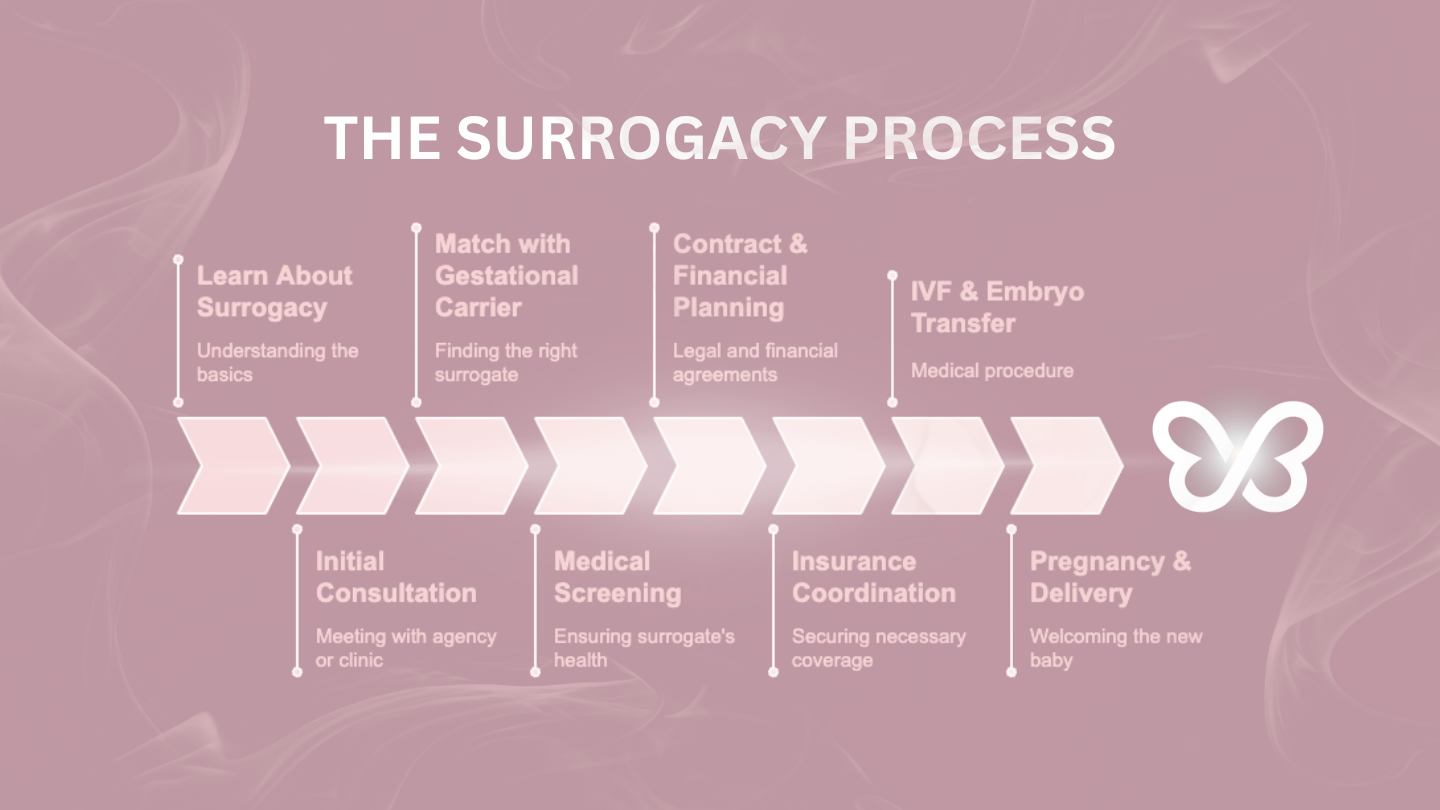Bringing a child into the world through surrogacy is one of the most meaningful journeys an intended parent can take. At SurrogateFirst, we’ve supported hundreds of families through this process—and we know how important it is to understand each step before you begin. Whether you’re just starting to research or are ready to move forward, this guide breaks down the surrogacy process from match to miracle in a clear, step-by-step format.

Starting the Surrogacy Process
Below you will find the key milestones of the surrogacy process. A detailed step-by-step surrogacy process is also available here.
Learn About Surrogacy
Surrogacy can seem overwhelming at first, so the best place to begin is by learning the basics. There are two main types—gestational surrogacy (most common in the U.S.) and traditional surrogacy. In gestational surrogacy, the surrogate carries a baby who is not genetically related to her.
Understanding the difference, as well as the legal, emotional, and financial aspects, is key to making an informed decision.
Initial Consultation
Once you’re ready to take the next step, a consultation with a surrogacy agency or fertility clinic can provide clarity. You’ll get to ask questions about the process, costs, expected timelines, and what kind of support you’ll receive.
At SurrogateFirst, this meeting is also about getting to know you—so we can help match you with the right surrogate.
Match With a Gestational Carrier
The matching process is one of the most exciting parts of your journey. Agencies like SurrogateFirst carefully screen all potential surrogates and look for alignment on values, expectations, and communication styles.
Intended parents are presented with profiles of qualified surrogates, and once a match feels right, a meeting is arranged to ensure everyone is on the same page.
Learn more about the matching process here.
Medical Screening
Once you’ve been matched with your surrogate, the next step is medical screening. This is where your surrogate begins a full medical work-up at your fertility clinic to gain official clearance to start the journey. This screening includes a physical exam, infectious disease testing, and an evaluation of her uterus to ensure she can safely carry a pregnancy. It’s a critical step that protects everyone involved, especially the future baby, and sets the foundation for a healthy and successful surrogacy experience.
Learn more about Medical Screening here.
Contract and Financial Planning
Surrogacy involves complex legal details, so both parties—intended parents and surrogates—must have their own legal representation. The surrogacy contract will cover everything from financial compensation to parental rights and delivery plans.
At SurrogateFirst, we work with top legal experts to ensure a smooth and ethical agreement for all involved.
Once contracts are signed, a secure escrow account is set up to manage payments for surrogate compensation and other related costs. This ensures peace of mind for everyone and transparent handling of all financial obligations.
Learn more about financial planning and financial help here.
Insurance Coordination
It’s important to have the right insurance coverage in place for your surrogate’s care and delivery. Your agency will help evaluate existing coverage and guide you through obtaining a surrogacy-friendly policy if needed.
More guidance about finding your surrogacy insurance is available here.
IVF & Embryo Transfer
With all plans in place, the medical phase begins. The surrogate will start a protocol of medications to prepare her uterus for embryo transfer. Once the embryo is transferred, the two-week wait begins.
A positive beta (pregnancy) test and subsequent heartbeat confirmation signal a successful start to the pregnancy.
Learn more about IVF surrogacy here.
Pregnancy & Delivery
Throughout the pregnancy, the surrogate receives regular prenatal care. Intended parents are encouraged to be involved—attending ultrasounds, joining appointments (virtually or in person), and building a connection with the surrogate if all parties are comfortable. Finally, the long-awaited moment arrives: the birth of your baby. The delivery plan is reviewed in advance to ensure everyone knows what to expect. This moment is powerful, emotional, and life-changing—and marks the beginning of a new chapter for your growing family.
Learn more about pregnancy and post birth here.
After Surrogacy: What Comes Next?
The surrogacy journey doesn’t end in the delivery room. Post-birth, legal paperwork finalizes parental rights, and many families stay in touch with their surrogates. At SurrogateFirst, we celebrate these lasting connections and offer continued support for both parents and surrogates long after the baby is born.
How SurrogateFirst Supports You Every Step of the Way
At SurrogateFirst, we believe in a compassionate, transparent, and personalized approach to surrogacy. From the moment you reach out to us until you’re holding your baby, our team is by your side—providing education, emotional support, expert coordination, and advocacy for both intended parents and surrogates. You can read more about all the ways we can support here.
FAQs About the Surrogacy Process
Here are some of most frequently asked questions we hear from Gay parents, answers by our expert team. More resources are available here.
How long does the surrogacy process take?
On average, from consultation to delivery, the process can take 12–24 months. This depends on how quickly you match, legal timelines, and embryo transfer success.
What is the legal process for surrogacy?
Each party is represented by their own attorney. Contracts cover parental rights, compensation, medical expectations, and post-birth arrangements. Legal finalization often occurs before or right after birth depending on your state.
Does the surrogate share DNA with the baby?
In gestational surrogacy, no. The surrogate is not biologically related to the child, as the embryo is created from the intended parents’ (or donors’) egg and sperm. You can read more about it in this article.
Can the surrogate change her mind?
Legal contracts are designed to protect all parties, and clear agreements prevent such issues. With proper support and ethical agency practices, this risk is extremely low.
Do surrogates get paid if they miscarry?
Surrogates are typically compensated for their time, effort, and milestones achieved. If a pregnancy ends early, payments reflect completed stages as outlined in the contract.
Why SurrogateFirst?
At SurrogateFirst, we’re more than a matching agency—we’re your support system.
- Compassionate, personalized matching
- 24/7 access to dedicated case managers
- Legal and medical coordination
- Transparent pricing
- Emotional support for surrogates and for intended parents alike






